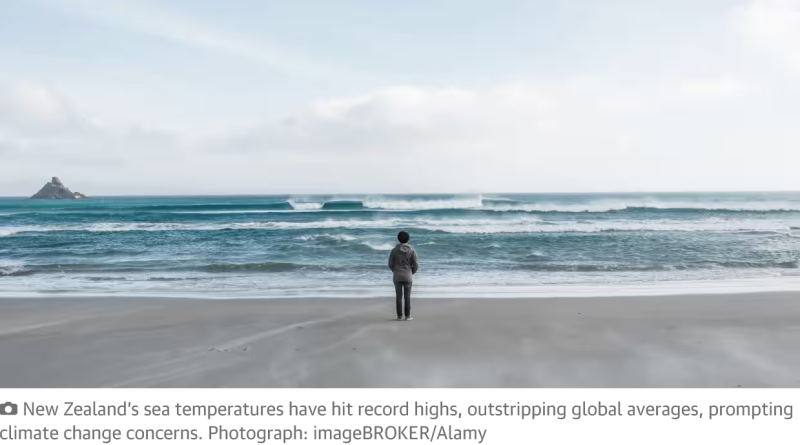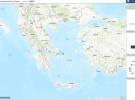New Zealand’s sea temperatures hit record highs, outstripping global averages

New Zealand’s sea temperatures have hit record highs, outstripping global averages threefold in one region, and prompting alarm over the health of the country’s marine life and ecosystems.
New data from Stats NZ shows since 1982, oceanic sea-surface temperatures have increased on average between 0.16 – 0.26C a decade, and between 0.19–0.34C a decade, in coastal waters.
Each oceanic and coastal region experienced their hottest years ever recorded in either 2022 or 2023.
When comparing data from the previous 20 years, the rate of ocean surface warming around New Zealand has outstripped the global per decade average of 0.18C twofold, with one region – the Chatham Rise – three times warmer than the global average, said Matt Pinkerton, a principal scientist at the National Institute for Water and Atmospherics.
New Zealand may be experiencing higher temperatures due to its geographical position and the way the global ocean currents move and carry heat, he said.
“New Zealand sits sandwiched between the Pacific, the Tasman Sea and the Southern Oceans – there’s a lot of warming associated in all three of those areas, so we are getting the heat from all directions.”
Pinkerton said New Zealand’s high temperatures dispel the notion that the island nation is protected from extreme temperatures.
“Because we are surrounded by so much ocean, we [thought] we were protected a bit by warming effects, this [data] is saying that’s not true.”
Marine heatwaves – prolonged periods of unusual seawater warmth – also reached new levels. The Western North Island experienced heatwave conditions for 89% of 2022 – the highest among coastal regions – while the Tasman Sea spent 61% of the year in a heatwave, the highest among oceanic regions.
“Even small rises in temperature can disrupt marine ecosystems, cause some species to relocate, and increase disease risks,” said Stuart Jones, the environmental and agricultural statistics manager at Stats NZ.
Previous intense marine heatwaves have already been linked to mass sea sponge bleaching in New Zealand, die-offs of southern bull kelp, large scale fish strandings and penguin deaths.
“Intense marine heatwaves can cause large scale ecological change by killing habitat-forming species such as kelp,” said Dr Christopher Cornwall, a marine biology lecturer at Victoria University of Wellington.
“It is highly likely that both the background warming and more frequent, intense, and longer marine heatwaves are already working to permanently alter these marine ecosystems within Aotearoa.”
Both Cornwall and Pinkerton add that the extent to which warmer oceans will disrupt ecosystems is still poorly understood, and long-term monitoring is needed to anticipate and plan for changes, particularly when assessing fishing quotas.
A separate Stats NZ dataset, released on Wednesday, showed phytoplankton – microscopic algae that form the base of marine food-webs – is tending to decrease in New Zealand’s warmer northern waters. The data suggests there is a correlation between the decrease in phytoplankton and rising sea-surface temperatures.
Meanwhile, New Zealanders will also feel the effects of warming seas, with the ocean dictating much of the island nation’s weather, said Dr Georgia Grant, a climate scientist at GNS Science.
The world’s oceans have been absorbing about 90% of the extra heat created from human-caused climate change.
“Increasing ocean temperatures are one of the factors as to why storms like Cyclone Gabrielle are expected to increase in severity under climate warming.”







